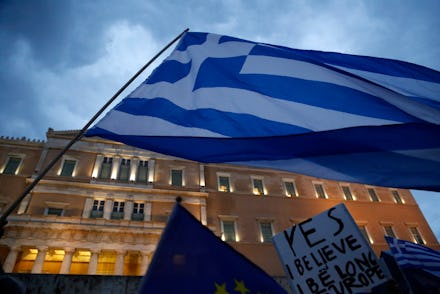Europe Can’t Wash Its Hands of Greece

After years of slow-burning crisis, things in Greece just got serious. The country defaulted on its loans to the International Monetary Fund on Wednesday, making it the first developed country in history to do so. The government shut down banks in order to prevent a complete banking collapse. A referendum is scheduled for Sunday to see whether Greeks want to accept a deal from European Union creditors.
For the last five years, EU politicians have tried to limit talk of Greek departure from the eurozone (coined the "Grexit"), claiming it was unthinkable. Now there is a very real possibility of Greece leaving the monetary union.
But let's start at the beginning.
The Greek government had been living beyond its means for decades before things started unraveling in 2009. As a socialist democracy, Greece had a sprawling welfare system. In exchange for its initial bailouts, Athens had to sharply rein in spending and hike taxes while its economy contracted. Government deficits ballooned, especially in relation to the rest of Europe.
Much of the money that Greece had been borrowing was held by other European banks, which became exposed to the Greek crisis. So while Greece struggled to regain its financial footing, European creditors reshuffled the debt Greece owed to minimize the exposure of their own banking systems.
The rest of Europe did a decent job insulating their banks from fallout by shifting the exposure to European bailout funds set up to specifically address the Greek crisis.
While Europe spent the last five years building firewalls, Greece had to slash benefits and pensions while raising taxes, decimating both the private and public sectors. The livelihood of ordinary Greeks was severely affected as Greek per-capita gross domestic product tumbled.
Unemployment followed. Particularly hard-hit were the youngest Greeks in the labor force.
Yet creditors insisted that Greece continue with an austerity program deeper than any other European country has had to undergo. Now that Europe has taken steps to protect itself, Europe's leaders are more worried about the politics, while Greece is still worried about the economics.
A flailing economy and high unemployment, especially among youths, propelled anti-austerity, radical left political party Syriza and its leader Alexis Tsipras to power in January. The Greek people gave Tsipras a mandate to push back against the so-called "Troika" of creditors (the European Union, the European Central Bank and the IMF) and their austerity-centered policies. His victory was decisive, allowing him to take a particularly aggressive stance.
Which brings us to this recent turmoil. The greatest leverage Tsipras had in five months of negotiations was the threat of Greece leaving the euro, and that possibility hung in the air during negotiations. As a result of its depressed economy, Greek banks remained solvent only through the European Central Bank's emergency assistance. Greeks knew that if negotiations with creditors failed, this lifeline would be shut off. As talks stalled, Greeks grew jittery and started pulling money from banks.
On June 26, Tsipras announced a surprise referendum to decide whether Greece will accept their creditors' proposal. He and his government are actively campaigning against the agreement, but haven't yet explained what they'll do if successful, or even if they fail. The bailout program has lapsed, and Greece missed its June payment to the IMF.
EU leaders have seized on the ambiguity of the vote to declare that the referendum is tantamount to a vote on euro membership. But as economies worsen, support for the euro tends to follow suit, making the referendum's outcome far from certain.
This referendum is important, even if it's not clear what Greece is voting on. For years, European officials have claimed the euro is inviolable. But the ambiguity surrounding Greece's referendum makes it a de facto vote on the euro, the first of its kind.
In all likelihood, Greece will vote to remain part of the euro and the EU. There is too much uncertainty about what would happen otherwise, and the Greek economy has undergone too much hardship to leave the currency now. A week of bank closures will undoubtedly have a sobering effect on the Greek public. Furthermore, even if the Greeks were to return to the drachma, their pre-EU currency, the country would still owe billions in debt that will need to be paid back in euros, regardless of what the Greek domestic currency is. And there is a lot of debt left to pay off, even in the short term.
But Greeks are right to push back against Europe and demand a better deal. After all, it's been five years of austerity and there are few signs that things are getting better.